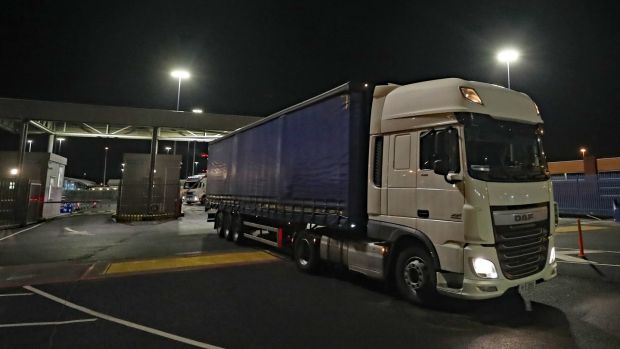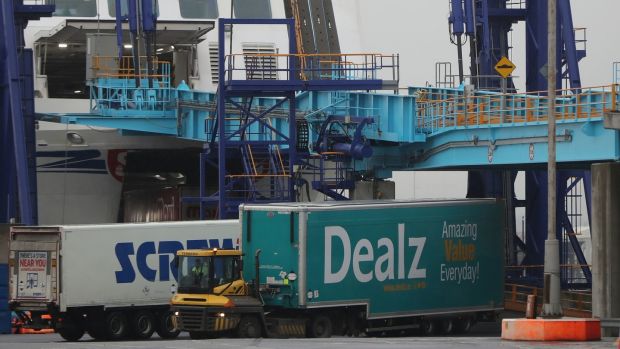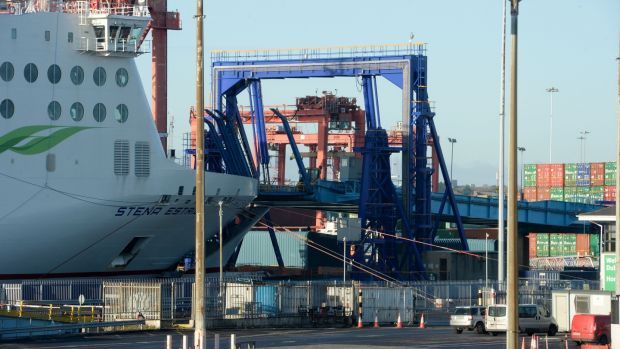Lorry traffic flowed smoothly through new post-Brexit border controls at Dublin Port, but one in five Irish-bound lorries arriving at Holyhead were turned back because of incorrect paperwork.
There were no delays at either Dublin, Rosslare or Holyhead ports. New Brexit systems to manage traffic and border checks worked after the United Kingdom’s departure from the European Union single market and customs union came into effect at 11pm on Thursday, though on unusually low-freight volumes.
Stena Line Ports, the company that operates Holyhead, said that about 20 per cent of a small number of lorries heading for ferries to Dublin were turned back. This occurred because they did not have correct paperwork in place in order to secure pre-boarding notifications to board the ferries.
A company spokesman said that after being turned away, most of the vehicles returned with their paperwork in order to be able to board. But a small proportion, about 5 per cent, were unable to embark because of incorrect documentation.
Dublin and Holyhead ports are the busiest on the Irish Sea with more than half of the freight traffic moving through Dublin heading to the Welsh port.
Lorry drivers were encouraged to have the correct paperwork in place so as to secure pre-boarding notifications for Irish ports.
Volumes were unusually low on what is “the quietest weekend of the year” for freight traffic moving through Irish Sea ports, said Tom Talbot, the head of customs operations for the Revenue Commissioners at Dublin Port on Friday. He expects traffic volumes to increase from Monday and to expand from Monday week as normal trade volumes resume.
“We had no concerns but we are well aware that this is an unusual day in terms of volume . . . our systems are working. We are ready for the increase in volume next week,” he said.

The online Revenue system to manage roll-on, roll-off freight coming off ferries through customs went live on Thursday evening ahead of the Brexit coming into effect.
Mr Talbot said that some lorry drivers did not check their “customs channel” 30 minutes out from docking at Dublin Port to see if they were “green routed” to exit the port or “red routed” to be directed to the Revenue’s customs or Department of Agriculture inspection facilities at the port.
“We can do this with a low number of units coming in, but when all vessels are coming in we need all drivers to check the channel,” he said.It is possible that some drivers left their point of departure “before Brexit kicked in” and did not realise customs paperwork had to be in place, he added.
Mr Talbot warned hauliers they face penalties and potential prosecutions if directions are ignored to visit customs facilities before leaving ports, if directed to do so.
Revenue did not plan to impose sanctions “on day one”. Its preference is to work with businesses where “genuine error” occurs, but action could be taken otherwise, he said. “Where we need to, Revenue will not be found wanting to apply those sanctions.”



A small number of lorries arriving from Holyhead on the first ferry of the day, Irish Ferries’ Ulysses, were directed to customs for checks that each took two to three minutes, he said.
“You had three trucks parking in an area that would take 170 trucks,” he said.
Hazel Sheridan, head of the Department of Agriculture’s import control division, said there was a consignment of horses on the 5.30am Irish Ferries vessel that underwent identity and physical checks before leaving Dublin Port but that there were no problems or delays with them.
Agriculture inspectors had no food consignments to scrutinise coming off ferries on Friday morning. But they would be obliged to carry out checks on plant- and animal-based food consignments as required under EU law, she said.
General manager of the Freight Transport Association Ireland Aidan Flynnsaid it would take weeks and not days for the new trading system with Britain to settle down.
“It is expected that there is going to be issues. Nothing like this just happens overnight and works seamlessly,” he said, noting that there had been “limited testing” of the new systems.
“The real cause of concern is that where mistakes are made and the authorities implement the rule of law, then the congestion builds up very, very quickly and that creates massive logjams in the system that we don’t want to see.”
Mr Flynn said if the same level of non-compliance, as experienced on day one, occurs when freight traffic with Britain returns to normal it will be a “challenge for everybody to rectify it very quickly”.

